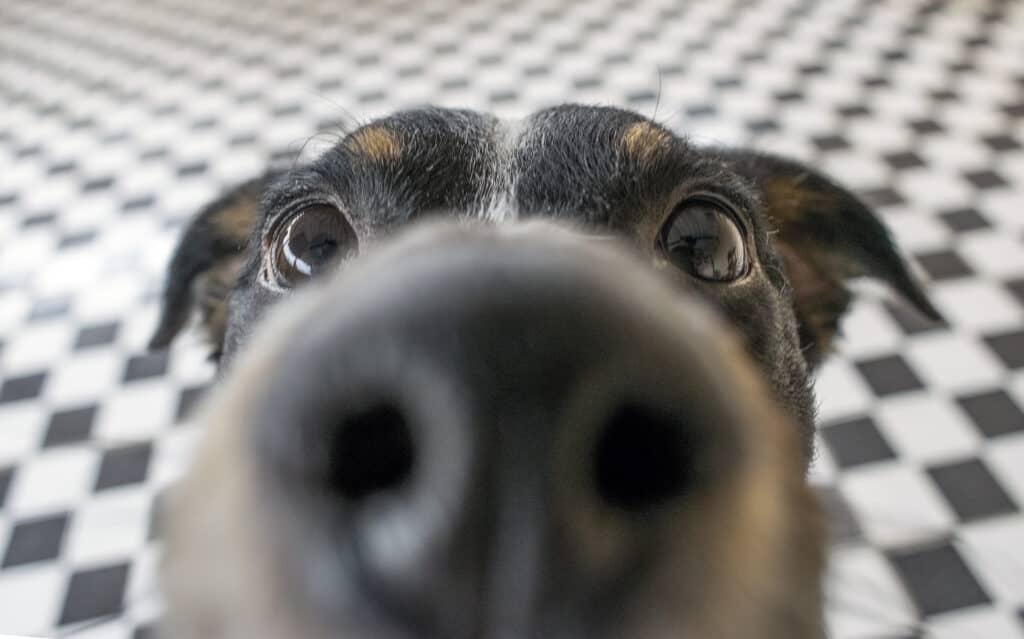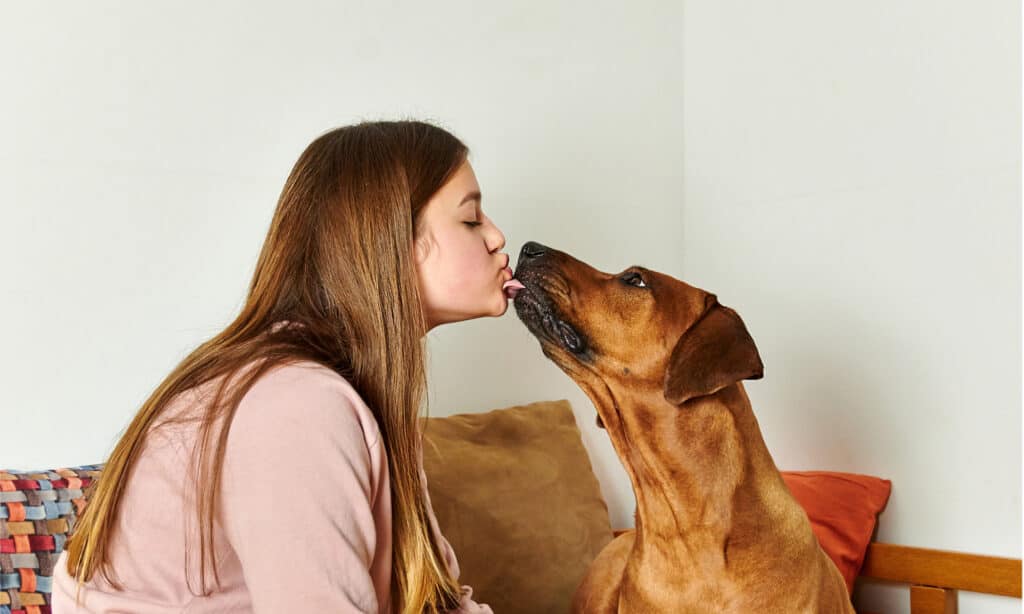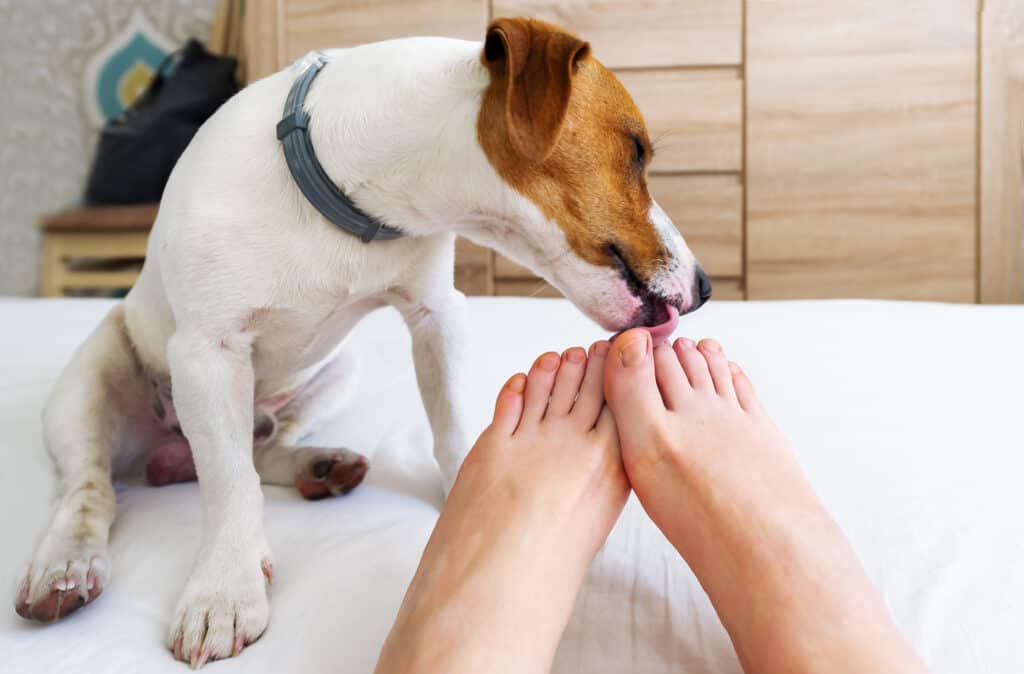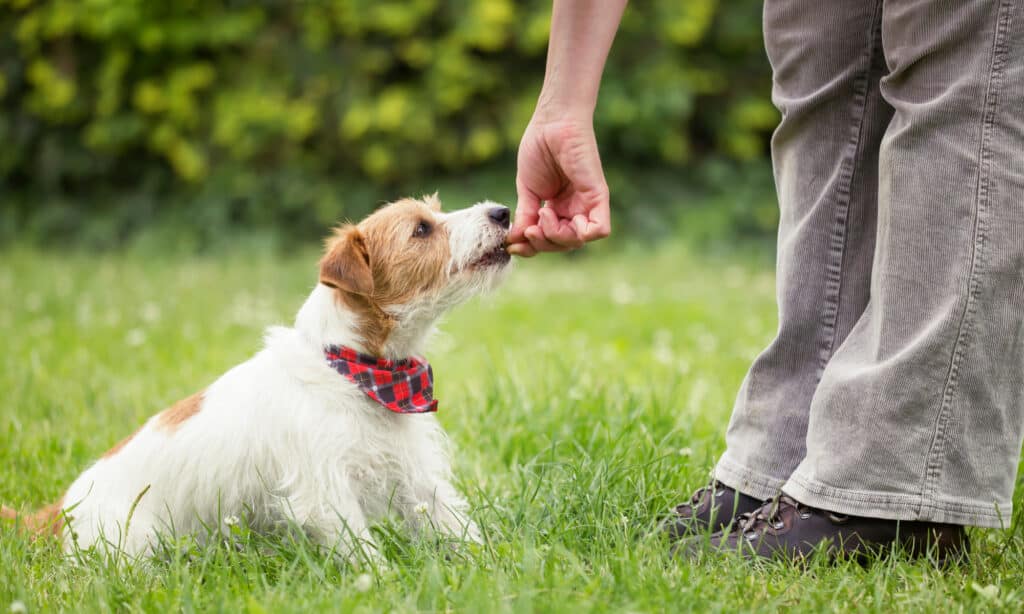According to the National Institutes of Health, human beings can identify more than 1 trillion smells. That’s a number so high that it outstretches the number of words the average person knows by about 20,000,000 times.
The average American knows around 50,000 words. The point is, our noses are capable of pretty amazing things.
Not if you asked a dog, though. Dogs smell roughly 100,000 times better than we do. This allows them to pick up on scents that are so minuscule, so faint, and so refined that the canine nose might be a reasonable alternative to highly advanced detectors for medical illnesses.

Dogs smell roughly
100,000 times better
than we do.
©iStock.com/brunorbs
Dogs Can Detect Cancer
To answer our central question, yes, you can train a dog to detect cancer via smell. They can smell the signs of cancer at all stages, even in the earliest stages.
“Medical detection dogs” are dogs with this type of training. Their training includes many ways other than to detect the smell of various cancers. For example, training to identify low blood sugar levels in their diabetic owners.
Owners with diabetes might not be aware their blood sugar levels are low and their dogs can alert them. This is particularly useful when dangerously low levels occur while a human is sleeping.
Dogs can wake their owners to alert them. Scientist believe all illnesses and diseases have corresponding smells. If this is true, then dogs might be able to detect all, if not most human illnesses and diseases.

Dogs might be able to detect all, if not most human illnesses and diseases.
©iStock.com/Zontica
Do Dogs Smell The Cancer Itself?
While it’s true that dogs can detect cancer in humans, it’s not necessarily true that they can “smell cancer” in every case.
Instead, they pick up on shifts in the smells of your body. Your urine, sweat, hair, hormones, and other smells might change subtly in response to your body’s cancer.
Dogs are able to recognize these shifts and alert owners when they’re present following training. Dogs have the ability to smell these shifts whenever we’re undergoing serious medical issues. While they might not know exactly what’s going on, they could have the idea that the thing happening isn’t necessarily good.
For example, a dog doesn’t know what cancer is. There are accounts, however, of dogs acting strangely and trying to paw at or nibble the area afflicted by cancer. These accounts are largely anecdotal, but they come up time and again.
Here’s a Terrier who incessant licking of his owner’s head for two years in the same spot. Following a doctor visit, the owner came away with a brain cancer diagnosis in the very same spot.
The reality is that they’re smelling something different, and they can recognize that difference even if they’re picking up a few parts per million of the odor. These bodily changes and smells start happening the moment cancer is present in the body.
So, it’s conceivable that a highly trained dog could detect cancer on the day that it forms. The idea that an untrained dog would look at the specific place on the body where cancer exists, though, suggests that they might be able to locate the actual smell of cancer.
Dogs’ noses are still more advanced than our literature on the subject, though, so it’s up for debate as to whether they can identify the position of cancer.

There are accounts of dogs acting strangely and trying to paw at or nibble the area afflicted by cancer.
©Kazlova Iryna/Shutterstock.com
Trained vs Untrained Detection
There’s a big difference between dogs trained to detect illnesses and those who aren’t. Both groups are able to smell the subtle shifts produced by the body of a person going through the issues, but the untrained dogs might not do anything about it.
Untrained Dogs
It’s totally unknown whether dogs smell things like cancer and know there’s something wrong. A malignant tumor found in a 250 million-year-old turtle bone suggests that cancer has been around for a very long time.
There could be an evolutionary response to the signs of cancer, particularly for those creatures with an advance in smelling capabilities. In that sense, dogs might have some inclination that there’s something wrong.
This, of course, is something that we don’t actually know. What we do know is that dogs are capable of smelling these smells, however infinitesimal they may be. That means that untrained dogs can pick up on the smell of cancer and might start behaving differently, although they could just behave the very same.

dogs have an extremely high detection rate for specific kinds of cancer.
©Reddogs/Shutterstock.com
Trained Dogs
A trained dogs, on the other hand, have an extremely high detection rate for specific kinds of cancer. Medical detection dogs might smell lung cancer on a person’s breath, identify ovarian cancer from blood samples, or prostate cancer from urine.
The signatures of cancer found in various bodily fluids or byproducts are relatively unknown. In other words, we do not completely understand the specific indicators the body gives off when cancer is present.
Dog training involves identifying the smell by working with people who have a specific cancer, getting familiar with the unique smells, then learning to alert the trainer when that smell is present in other individuals.
While training dogs to locate specific cancers, it is understood the markers of different cancers could be the same. This would give trained dogs the ability to accurately identify numerous types of cancer.
A study showed that detection dogs looking for breast cancer had the ability to accurately detect lung cancer and melanoma as well.
What’s Next?
- Can Dogs Smell Fear?
- Why Do Dogs Howl? And What You Should Do About It
- Why Do Dogs Tilt Their Heads? The Behavior Explained
- Why Do Dogs Have Tails? The Surprising Reason
The photo featured at the top of this post is © Medvedeva Oxana/Shutterstock.com
Ready to discover the top 10 cutest dog breeds in the entire world?
How about the fastest dogs, the largest dogs and those that are -- quite frankly -- just the kindest dogs on the planet? Each day, AZ Animals sends out lists just like this to our thousands of email subscribers. And the best part? It's FREE. Join today by entering your email below.
Sources
- Medical News Today / Accessed September 28, 2022
- Pet MD / Accessed September 28, 2022
- UPI / Accessed September 28, 2022
- Wag Walking / Accessed September 28, 2022
- Doc Mode / Accessed September 28, 2022
- Lab Roots / Accessed September 28, 2022
FAQs (Frequently Asked Questions)
Which dogs can smell cancer?
Numerous dog breeds have the ability to smell cancer. Bloodhounds have the greatest sense of smell of all dogs, so they are a popular breed in medical detection.
Other top sniffers are Beagles, German Shepherds, Labrador Retrievers, Dachshunds, and Basset Hounds.
Will my dog know if I have cancer?
Your dog will, in all likelihood, detect something different if you have cancer. They could alert you to it in their own way, but odds are that they will not. Dogs need to be trained to identify and notify their owners of cancer.
That said, most dogs are capable of smelling cancer in humans, even during its earliest stages.
How do dogs respond if someone has cancer?
If you’re wondering whether your dog is telling you that you have cancer, it’s best to go to the doctor. Your dog could be letting you know something’s wrong.
Although this isn’t proven, some people say that dogs will paw at a particular place in the body or try and access the cancer in some way. Trained dogs, on the other hand, will bark or send some kind of signal to their trainers.
Thank you for reading! Have some feedback for us? Contact the AZ Animals editorial team.







